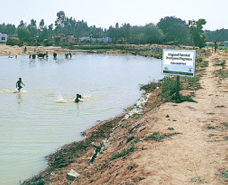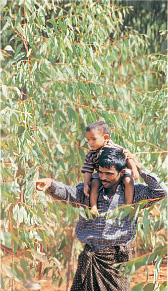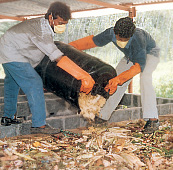| |
Rainwater Harvesting: Towards becoming a water positive corporation
ITC continues with its efforts to enlarge Rainwater Harvesting (RWH) potential both within its units and in socially relevant watershed development projects.
 |
All figures in Million KL |
TOWARDS BEING A CARBON POSITIVE CORPORATIONITC units consumed 11,439 Terra Joules of energy in 2003-04. Nearly 96.6 per cent of this energy requirement was generated internally. The proportion of energy produced from waste was 24 per cent of total consumption in 2003-04, compared to 18 per cent in 2002-03. In tune with international efforts to control global warming, ITC is working towards neutralising carbon dioxide emission in its operating environment. ITC’s paperboards Unit at Bhadrachalam is the only pulp & paperboard Unit in the country to produce environment-friendly Elemental Chlorine-Free (ECF) pulp. ITC Units engage in significant tree plantation activities in their vicinity. ITC’s unique farm and social forestry programmes have acquired significant size. The Company’s commitment to greening 100,000 hectares by helping grow more plantations in the coming years will make ITC a Carbon Positive Corporation. ITC sequesters
almost a third of CO2
released ( 2003-04) |
 |
| Unit | 2003- 04 | |
| CO2 Released (Manufacturing / Travel / Freight) |
Kilotonnes | 1013 |
| CO2 Sequestered | Kilotonnes | 311 |
| CO2 Sequestered | Percentage | 31 |
TOWARDS ‘ZERO’ SOLID WASTES
Waste reduction efforts gained momentum with improvements in recycling. End users are being identified for every kind of solid waste, thereby initiating a movement towards ‘Zero’ solid waste discharge from all units.
A unique environmental initiativeITC's Bhadrachalam factory has set up a 'Zero waste centre' at its colony, comprising residential units, guest houses, club, staff canteen and bachelors' hostel. Waste is collected and segregated. Plastic, paper and inorganic wastes are recycled. Wet and organic wastes are used as compost. The centre has been able to generate revenue from waste to cover its operational expenses. |
 |
| |